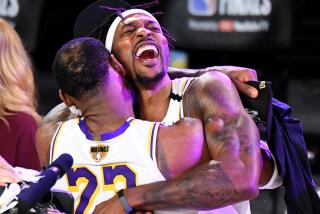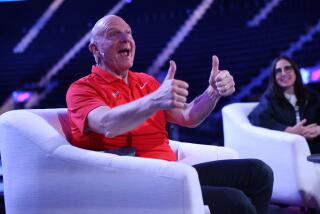NBA executives talk about the Chris Paul trade, and the ‘T’ word enters the conversation

Paul agreed instead to opt-in with the Clippers so that the team could trade him for assets. (June 28, 2017) (Sign up for our free video newsletter here http://bit.ly/2n6VKPR)
- Share via
NBA teams aren’t allowed to begin negotiating with free-agent players until 9 p.m. PDT on Friday.
So how was it that Chris Paul informed the Clippers on Tuesday, three days before that window was to open, that he wanted to join the Houston Rockets?
The question was posed to several team executives around the league, who all spoke on the condition of anonymity because of the sensitive nature of the topic.
“I don’t want to use the ‘T’ word — tampering — but we all don’t play by the rules when it comes to making deals,” one Eastern Conference executive said. “Besides, nobody is going to rat anybody out. That’s how this league works.”
Less than 24 hours after informing Clippers officials of his wishes, Paul was traded to the Rockets on Wednesday in exchange for seven players and a 2018 first-round draft pick.
Before the deal happened, he opted back in — earlier he had opted out — to his $24-million contract for next season, which saved the Rockets time and money.
Beyond the typical “how it leaves the Clippers/what it does for the Rockets” discourse, the move prompted an additional response in some of the league’s front offices. In summary, something along the lines of: “Hmmm. That was fast.”
“Every team is looking for an advantage,” one executive said. “The deal got done way too fast for somebody not to be talking already. That happened real quick. But hey, that’s how it goes in this league.”
Several team executives wondered whether the Rockets had a head start in negotiations.
According to one NBA executive, James Harden, the Rockets’ all-star guard, had been recruiting Paul throughout the season. An executive from another team said Harden had already told a fellow NBA player that Paul’s going to Houston was a done deal.
Teams aren’t supposed to have conversations with another team’s player until the free-agency period starts, but it happens all the time through back channels — players talking to other players, or an agent spreading the word, neither of which is against the rules — according to the front-office officials throughout the league.
During the 2015-16 season, several people in the league said that Golden State Warriors players doggedly recruited Kevin Durant, even while he played for the rival Oklahoma City Thunder.
After that season was over, Durant become an unrestricted free agent and joined the Warriors, with whom he won the NBA championship this season.
“Everybody uses agents to do their dirty work or they have a star player talk to another player on another team,” one team executive said. “Then it doesn’t affect the [general manager].”
One player agent said that it made sense for NBA executives to talk about acquiring players before the free-agent market opens.
“Otherwise, if they don’t, they can wait too late and lose out on a player,” the agent said. “It’s called job preservation for a front-office executive.”
Twitter: @BA_Turner
More to Read
Go beyond the scoreboard
Get the latest on L.A.'s teams in the daily Sports Report newsletter.
You may occasionally receive promotional content from the Los Angeles Times.







